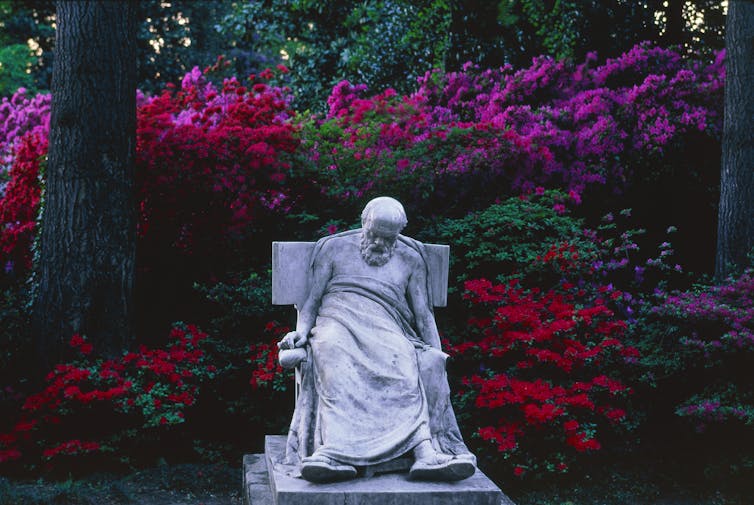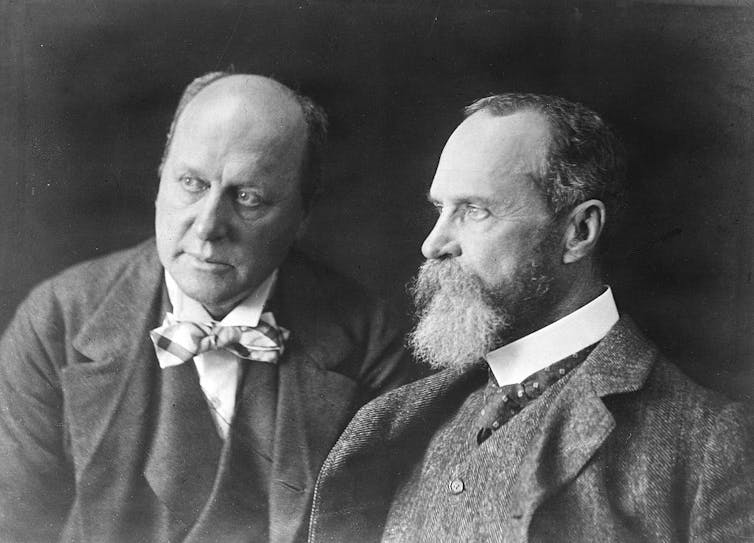
Experts in autocracies have pointed out that it is, unfortunately, easy to slip into normalizing the tyrant, hence it is important to hang on to outrage. These incidents which seem to call for the efforts of the Greek Furies (Erinyes) to come and deal with them will, I hope, help with that. As a reminder, though no one really knows how many there were supposed to be, the three names we have are Alecto, Megaera, and Tisiphone. These roughly translate as “unceasing,” “grudging,” and “vengeful destruction.”
Messaging. We all know that our greatest difficulty is in messaging. When we achieve things, conditions improve foreveryone. With progessive administrators, the economy getsbetter. With progressive prosecutors, crime goesdown. And on and on. But – getting people whp don’t already think progressively to see it – That seems to be a Sisyphean challenge. And ths article on Socrates, aimed at helping people to message, really almost does the opposite. I mean – look at how ir worked for Socrates. However, his techniques do help us as individuals to understamd what we are talking about, what we know, and what we don’t know, which can be much more important. I’ll share what I believe to be a better guideline on bridging the gap between knowing and messaging below
==============================================================
What Socrates’ ‘know nothing’ wisdom can teach a polarized America

Yoeml/iStock via Getty Images Plus
J. W. Traphagan, The University of Texas at Austin and John J. Kaag, UMass Lowell
A common complaint in America today is that politics and even society as a whole are broken. Critics point out endless lists of what should be fixed: the complexity of the tax code, or immigration reform, or the inefficiency of government.
But each dilemma usually comes down to polarized deadlock between two competing visions and everyone’s conviction that theirs is the right one. Perhaps this white-knuckled insistence on being right is the root cause of the societal fissure – why everything seems so irreparably wrong.
As religion and philosophy scholars, we would argue that our apparent national impasse points to a lack of “epistemic humility,” or intellectual humility – that is, an inability to acknowledge, empathize with and ultimately compromise with opinions and perspectives different from one’s own. In other words, Americans have stopped listening.
So why is intellectual humility in such scarce supply? Of course, the quickest answer might be the right one: that humility runs against most people’s fear of being mistaken, and the zero-sum view that being right means someone else has to be totally wrong.
But we think that the problem is more complex and perhaps more interesting. We believe epistemic humility presents something of a twofold danger that makes being humble frightening – and has, ever since Socrates first put it at the heart of Western philosophy.
Knowing you don’t know
If your best friend told you that you were the wisest of all human beings, perhaps you would be inclined to smile in agreement and take the dear friend for a beer. But when the ancient Athenian Socrates was delivered this news, he responded with sincere and utter disbelief – even though his friend had confirmed it with the Delphic oracle, the fortune-telling authority of the ancient world.
This nascent humility – “No, get out of here, I’m definitely not the wisest” – helped spark what became arguably the greatest philosophical life of all time. Despite relative old age, Socrates immediately embarked on a journey to find someone wiser than himself and spent many days seeking out the sages of the ancient world, a quest Plato recounts in his “Apology of Socrates.”
The problem? He discovered that the sages thought they knew more than they actually did. Eventually, Socrates concluded that he himself was, in fact, the wisest of all men, because at least he “knew that he didn’t know.”
This is not to say that Socrates knew nothing: He demonstrates time and again that he knows a lot and routinely demonstrated good judgment. Rather, he acknowledged there were definite limitations to the knowledge he could claim.
This is the birth of “epistemic humility” in Western philosophy: the acknowledgment that one’s blind spots and shortcomings are an invitation for ongoing intellectual investigation and growth.

tumsasedgars/iStock via Getty Images Plus
Provoking the powerful
But this mindset can feel dangerous to other people – especially if they feel absolutely certain in their convictions.
In ancient Athens, as much as in the U.S. today, being perceived as right translated into money and power. The city-state’s culture was dominated by the Sophists, who taught rhetoric to nobles and politicians, and the Poets, ancient playwrights. Greek theater and epic poetry were closely related to religion, and their creators were treated as mouthpieces for aesthetic and moral truth.
What’s more, theater and poetry were also major moneymakers, which motivated artists to adopt a mentality of “fail fast, fail better,” with an eye to eventually proving correct and getting paid.
By critically interrogating the idols and polarized views of his culture, Socrates threatened the power holders of his city. A constantly questioning figure is a direct threat to individuals who spend their lives defending unquestioned belief – whether it’s belief in themselves, their superiors or their gods.
Take Euthyphro, for example, one of Socrates’ principal interlocutors. Euthyphro is so sure that he knows the difference between right and wrong that he is bringing his own father to trial. Socrates quickly disabuses him of his certainty, famously debating him about the true meaning of piety.
Or take Meletus, the man who eventually brought Socrates to trial on accusations of corrupting youth. In Plato’s account of the trial, it takes Socrates no time to show this “good patriot,” as Meletus calls himself, that he does not understand what patriotism truly means. Without any pretensions to knowing the absolute truth, Socrates is able to shed light on the underlying assumptions around him.
It’s frustrating to read the Platonic dialogues, the works of philosophy that recount Socrates’ life and teaching, in part because Socrates rarely claims the final word on any subject. In short, he gives more questions than answers. But what remains constant is his openness to uncertainty that keeps his inquiry on the move, pushing his inquiries further and deeper.
Paying the price
The second danger of epistemic humility is now probably in view. It’s the danger that Socrates faced when he was brought to trial for corrupting Athens’ youth – the danger to the humble skeptics themselves.
He is brought up on two very serious charges. The first was an accusation that he taught students to make the weaker argument appear to be the stronger – which is actually what the Sophists did, not Socrates. The second was that he had invented new gods – again, he didn’t do that; poets and playwrights did.
What was he really guilty of? Perhaps only this: Socrates criticized the arrogant self-assertion of his culture’s influencers, and they brought him to trial, which concluded in his death sentence.

Roland Gerth/The Image Bank via Getty Images
Socrates taught that being humble about one’s own views was a necessary step in searching for truth – perhaps the most essential one. That was and perhaps still is a revolutionary view, because it forces us to challenge preconceived ideas about what we believe, what we worship and where we tap meaning. He placed himself in the middle of Athenians’ sharply polarized debates about what truth and goodness were, and he was the one who got hit.
“Humility like darkness,” wrote American philosopher Henry David Thoreau, “reveals the heavenly lights.” Put another way, humility about the verity, accuracy and wisdom of one’s ideas can reveal the fact that others have understandable reasons for thinking as they do — as long as you try to see the world as they are seeing it. In contrast, arrogance tends to extinguish the “heavenly light” about what we still don’t fully understand.
Being humble about one’s position in the world is not an invitation for a post-truth, anything-goes opinion free-for-all. Truth – the idea of truth – matters. And we can pursue it together, if we are always open to being wrong.![]()
J. W. Traphagan, Professor Emeritus of Religious Studies, The University of Texas at Austin and John J. Kaag, Professor of Philosophy, UMass Lowell
This article is republished from The Conversation under a Creative Commons license. Read the original article.
==============================================================
Alecto, Megaera, and Tisiphone, the life and teachings of Socrates are certainly instructive as to why people who want simple, short, and easily grasped ideas consider those of us who want facts, hard data, and reality to be elitists who look down on them. But how to turn that knowledge nto actual messaging is something else entirely.
I have not seen a better summation of what it takes to message to Republican voters than this, from our own Lona (emphasis mine):
What Americans need are short simple messages from Democrats that are easy to understand…uhh much like Republican messaging, you mean? I hope Democrats learn the art of messaging in time. Short, directed at creating a gut-feeling not so much as giving all relevant information and easily remembered. Creating that is about the only thing Republicans are good at. Democrats will have a harder time, because theirs will have to have some truth in it.
Of course, knowing what we need to create is no the same as creating it. But then, if you’re not sure where you’re going, you’ll probably end up someplace else. At least having a destination is a start.
The Furies and I will be back.
















